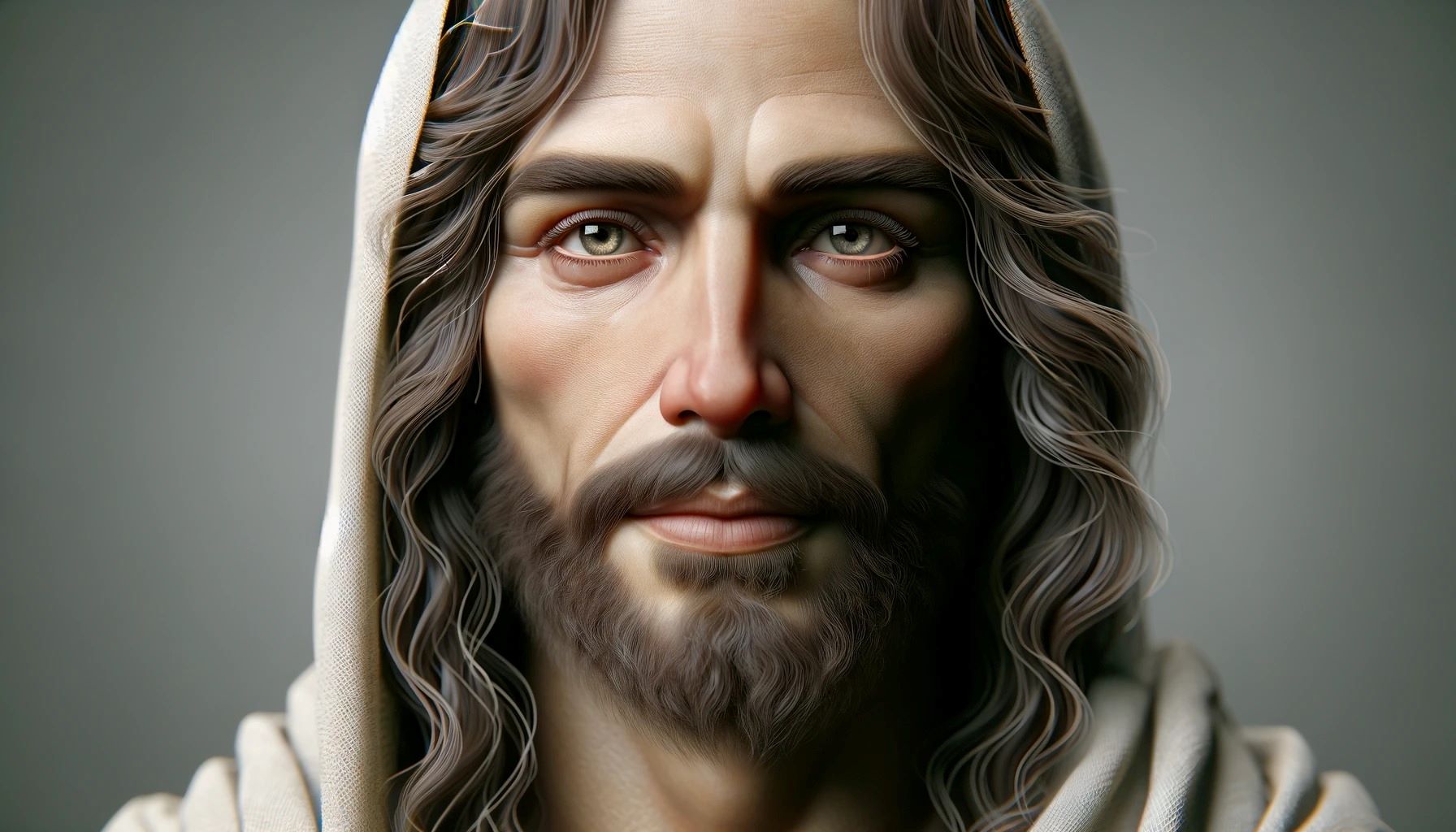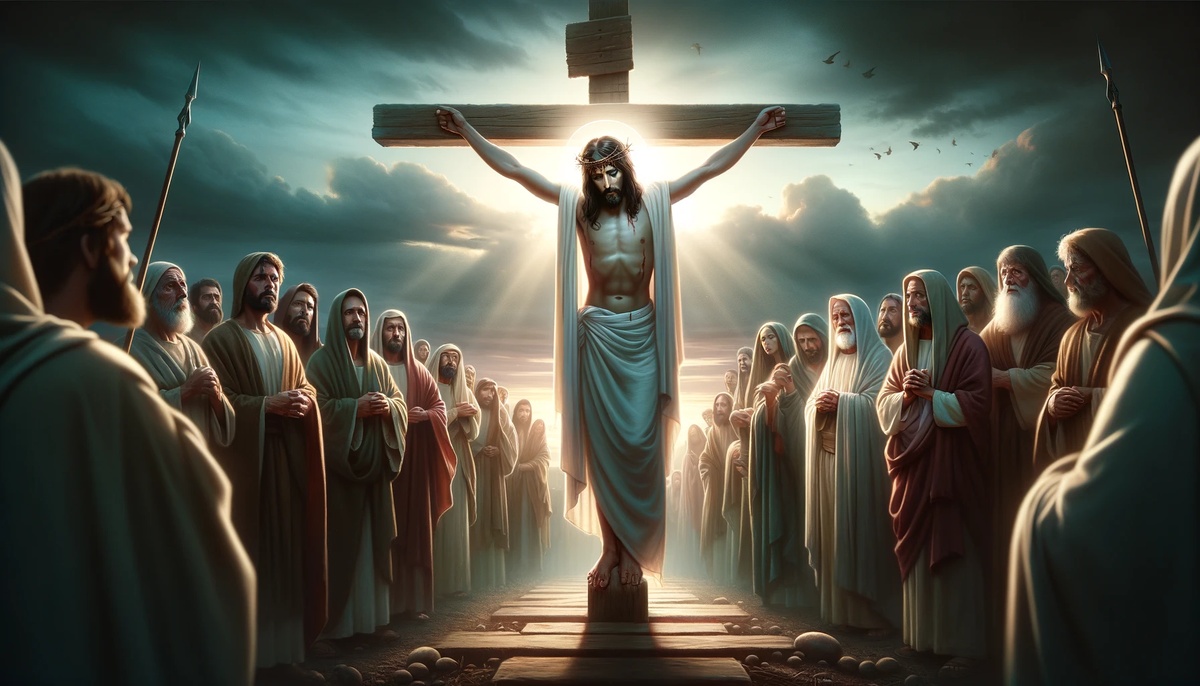Home>Christian Videos>Bible Stories>What 3 Reasons Are Stated In Scripture For Why God Became A Man In The Person Of Jesus Christ


Bible Stories
What 3 Reasons Are Stated In Scripture For Why God Became A Man In The Person Of Jesus Christ
Published: March 1, 2024
Peter Smith, Editorial Director at Christian.net, combines deep insights into faith, politics, and culture to lead content creation that resonates widely. Awarded for his contributions to religious discourse, he previously headed a major organization for religious communicators, enhancing dialogue on faith's societal impacts.
Discover the three scriptural reasons for God becoming a man in the person of Jesus Christ. Explore the significance of this event in the Bible stories.
(Many of the links in this article redirect to a specific reviewed product. Your purchase of these products through affiliate links helps to generate commission for Christian.net, at no extra cost. Learn more)
Table of Contents
The Purpose of Redemption
The purpose of redemption is a central theme in Christian theology, and it is deeply rooted in the belief that God became a man in the person of Jesus Christ to fulfill a specific purpose. This purpose is none other than the redemption of humanity from sin and the restoration of a broken relationship with God. The concept of redemption is intricately woven into the fabric of Christian faith, and it is essential to understand the reasons stated in scripture for why God took on human form in the person of Jesus Christ.
-
Atonement for Sin: One of the primary reasons stated in scripture for why God became a man in the person of Jesus Christ is to provide atonement for the sins of humanity. The Bible teaches that all have sinned and fallen short of the glory of God (Romans 3:23), and the consequence of sin is death (Romans 6:23). However, God's love for humanity was so great that He sent His only Son, Jesus Christ, to bear the penalty for sin on the cross. This act of atonement was necessary to reconcile humanity to God and to offer the gift of salvation to all who believe in Jesus Christ (John 3:16).
-
Victory Over Death and Evil: Another reason for God becoming a man in the person of Jesus Christ is to achieve victory over death and evil. The Bible teaches that through His death and resurrection, Jesus conquered sin, death, and the powers of darkness (Colossians 2:15). By taking on human form and experiencing death, Jesus demonstrated His power over the forces of evil and offered the hope of eternal life to all who put their trust in Him. This victory over death and evil is a fundamental aspect of the purpose of redemption through Jesus Christ.
-
Restoration of Fellowship with God: The ultimate purpose of redemption through Jesus Christ is the restoration of fellowship with God. The Bible emphasizes that God's desire is for all people to be reconciled to Him and to experience the fullness of life in His presence (2 Corinthians 5:18). Through His incarnation, sacrificial death, and resurrection, Jesus provided the means for humanity to be restored to a right relationship with God. This restoration of fellowship with God is a central aspect of the purpose of redemption and underscores the depth of God's love for humanity.
In summary, the purpose of redemption through the person of Jesus Christ encompasses atonement for sin, victory over death and evil, and the restoration of fellowship with God. These reasons, as stated in scripture, highlight the profound significance of God becoming a man in the person of Jesus Christ and the transformative impact of His redemptive work on behalf of humanity.
Read more: Why Is Jesus Christ The Son Of God
The Fulfillment of Prophecy
-
Messiah Prophesied in the Old Testament: The fulfillment of prophecy is a compelling reason stated in scripture for why God became a man in the person of Jesus Christ. Throughout the Old Testament, numerous prophecies foretold the coming of a Messiah who would bring salvation and deliverance to the people. These prophecies described specific details about the birth, life, and mission of the Messiah, and they were fulfilled in the person of Jesus Christ. For example, the prophet Isaiah foretold that a virgin would conceive and give birth to a son, and he would be called Immanuel, which means "God with us" (Isaiah 7:14). This prophecy found its fulfillment in the birth of Jesus Christ, who was born of the virgin Mary and embodied the presence of God among humanity.
-
Fulfillment of Messianic Prophecies: The fulfillment of Messianic prophecies in the life of Jesus Christ serves as a powerful testament to His identity as the long-awaited Messiah. Prophecies such as His birth in Bethlehem (Micah 5:2), His ministry to the poor and oppressed (Isaiah 61:1), His betrayal for thirty pieces of silver (Zechariah 11:12-13), and His crucifixion alongside criminals (Isaiah 53:12) were all fulfilled in the life and death of Jesus. These fulfillments underscore the divine orchestration of God's plan for redemption through the person of Jesus Christ and affirm the significance of His role as the fulfillment of Old Testament prophecies.
-
Confirmation of God's Faithfulness: The fulfillment of prophecy in the person of Jesus Christ serves as a confirmation of God's faithfulness to His promises. The meticulous fulfillment of numerous prophecies in the life, death, and resurrection of Jesus Christ demonstrates the divine precision and sovereignty of God in orchestrating the events of human history. This confirmation of God's faithfulness through the fulfillment of prophecy provides a solid foundation for faith in Jesus Christ as the promised Messiah and affirms the trustworthiness of God's word as revealed in the scriptures.
In essence, the fulfillment of prophecy in the person of Jesus Christ validates His identity as the long-awaited Messiah, confirms God's faithfulness to His promises, and underscores the divine orchestration of God's redemptive plan for humanity. The fulfillment of Messianic prophecies in the life of Jesus Christ stands as a testament to the divine authority and sovereignty of God and highlights the profound significance of His incarnation for the fulfillment of God's purposes in the world.
The Demonstration of God's Love
-
Revelation of God's Character: The demonstration of God's love through the person of Jesus Christ serves as a profound revelation of God's character. The Bible teaches that "God is love" (1 John 4:8), and the incarnation of Jesus Christ exemplifies the depth and extent of God's love for humanity. In the person of Jesus, God revealed His compassion, mercy, and sacrificial love in a tangible and relatable manner. The life, teachings, and selfless sacrifice of Jesus Christ serve as a powerful demonstration of God's love for humanity, inviting people to experience the transformative impact of His love in their lives.
-
Redemptive Act of Self-Sacrifice: The demonstration of God's love through the self-sacrifice of Jesus Christ on the cross is a central aspect of Christian faith. The Bible states, "Greater love has no one than this: to lay down one's life for one's friends" (John 15:13). In willingly offering Himself as a sacrifice for the sins of humanity, Jesus demonstrated the ultimate expression of love. His death on the cross was a redemptive act that provided the means for reconciliation between God and humanity, highlighting the depth of God's love and His desire for the salvation of all people.
-
Invitation to Relationship and Restoration: The demonstration of God's love through Jesus Christ extends an invitation to all people to enter into a relationship with God and experience the restoration of their lives. The Bible affirms, "But God demonstrates his own love for us in this: While we were still sinners, Christ died for us" (Romans 5:8). This demonstration of love conveys the message that God's love is unconditional, reaching out to individuals in their brokenness and offering the hope of forgiveness, healing, and new life through faith in Jesus Christ. The demonstration of God's love through Jesus Christ is an invitation to embrace the transformative power of God's love and to enter into a restored relationship with Him.
In summary, the demonstration of God's love through the person of Jesus Christ reveals the depth of God's character, exemplifies the redemptive act of self-sacrifice, and extends an invitation to relationship and restoration. The incarnation, life, and sacrificial death of Jesus Christ stand as a testament to the immeasurable love of God for humanity, offering hope, forgiveness, and the promise of eternal life to all who believe.















